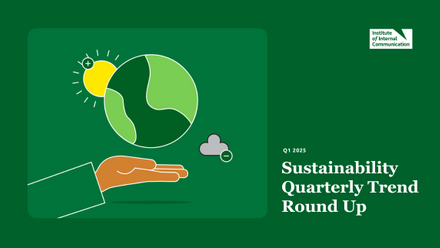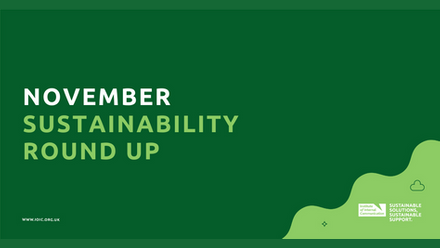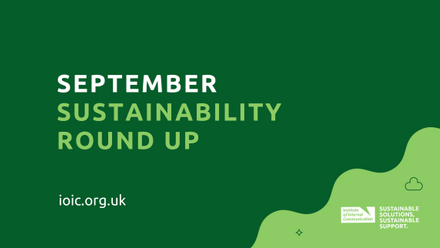1. Community sustainability
People, Planet, Pint. You’d be hard-pushed to devise a more ‘community’-focused name for a sustainability initiative.
As a concept, it was devised by Adam Bastock, founder of Small99. He recognised that 99% of businesses are small and that current government guidance isn’t accessible for most of them to take action.
Consequently, he came up with the idea for an organisation with a clear mission – to guide the one million micro businesses in the UK to net zero by 2025.
The first People, Planet, Pint gathering was held during COP26 to encourage people concerned about the climate crisis and sustainability issues to meet, network, share knowledge and brainstorm ideas for local community action.
From there it’s snowballed and there are now regular events held up and down the country. Its sponsor Krystal offers a free first drink to newcomers.
At their gatherings, people from all diverse backgrounds convene to chat with like-minded others. Essentially, people who lament the continued ineffectiveness of our government, politicians and policymakers to bring change.
If the climate crisis often feels like an insurmountable problem, when we focus on creating the spaces for community-building, people soon realise they’re not alone.
The IC sector can certainly learn a lot from grassroots community initiatives such as People, Planet, Pint when it comes to effecting change within our own organisations. After all, collaboration is hardwired into our DNA – so when we give that a platform, very quickly, motivation and intention take root, and amazing things start to happen.
2. Organisational sustainability
We’ve all have read about the (often none-too successful!) back-to-the-office mandates certain large organisations have imposed recently on their people.
But here’s another piece of the distributed work puzzle that C-suite members – and by extension the IC sector – will have to take on board.
The flexibility that remote working brings to us as individuals will also have organisational benefits in a world that is going to be increasingly subject to extreme weather events. After all, if it wasn’t safe for people to go to offices during the recent global pandemic, there will almost certainly be instances where the same applies to workplaces, as we experience the consequences of a warming planet.
The authors of this article argue that we are going to need more, not less, remote work as the climate crisis worsens. Enabling that flexibility is going to provide organisational and commercial advantages – and we as IC professionals will need to continue to adapt to get the most out of how we communicate with our colleagues, regardless of where they are.
3. Economic sustainability
If we’re to save the planet, will we have to kill off ‘the consumer’?
Andrea Hartley, serial entrepreneur and Founder/CEO of social impact consultancy Skating Panda, certainly thinks it’d be a start. She believes that if businesses are serious about embracing climate action, they must collectively turn their backs on the idea of ‘the consumer’, and instead start thinking of individuals as ‘rounded citizens’ – and, in tandem, invest in long-term sustainability initiatives for the benefit of people, planet and profits too.
She argues that it’s time to move on from regarding people as ‘wallets with legs’ or as a single, homogenous ‘consumer’ – and the accompanying limitations that brings in defining human beings in terms of what they consume.
She outlines five key steps businesses can take to help redesign consumption and bring enhanced co-operation between business and individuals – and IC clearly has a potentially pivotal role in most of these, in terms of leading and bringing the change, to help deliver a responsible and more future-focused approach to sustainability within our organisations.
4. Environmental sustainability
2023 certainly proved to be quite the tipping point when it comes to the climate emergency – not least for being the year when businesses and organisations can no longer take a ‘head-in-the-sand’ approach to what’s happening to our planet.
And sometimes the consequences of our rapidly changing environment manifest themselves in pretty unexpected ways.
For instance, few of us would’ve joined the dots that the El Niño climate pattern associated with warmer-than-usual water in the central and eastern tropical Pacific Ocean is contributing to the current drought in Panama, which in turn has led to the authorities that manage The Panama Canal – one of the world's key maritime trade routes – to drastically reduce daily ship crossings over the coming months.
These passage restrictions are designed to conserve scarce water, and have led to long delays, with many vessels waiting to transit the canal. This in turn has had the knock-on effect of pushing up shipping rates globally and disrupting global distribution chains, by decreasing the number of vessels currently available.
So, what’s the learning here for us as IC professionals? We need to take more of a 360-degree approach when it comes to thinking about the climate crisis – and start getting used to the fact that some of the consequences for our organisations may well start to emanate from increasingly unexpected quarters.
5. Personal sustainability
We’ll all have heard of ‘quiet quitting’ – but what about the burgeoning trend of 'climate quitting'?
That describes the growing number of workers who are making the decision to ditch their corporate roles and walk out of organisations whose environmental values don't align with their own.
According to research by carbon removal marketplace Supercritical, 35% of the 2,000 UK office workers it surveyed said they were willing to quit their jobs over weak climate action from their employers. That figure increases to 53% for Gen Z employees.
That’s a surprisingly high number – but perhaps not, when we remember that we’re facing an existential crisis.
As IC professionals, we can provide an interpretive bridge within our organisations to ensure all voices are heard. Encouraging the disenchanted to stay by making them part of the change within our businesses could help spur long-term positive action – and ultimately be a win-win.
Listening to – and empathising with – the reasons our own potential ‘climate quitters’ give for seeking out greener pastures might help future-proof our organisations – and keep churn to a minimum in a highly competitive talent marketplace.




